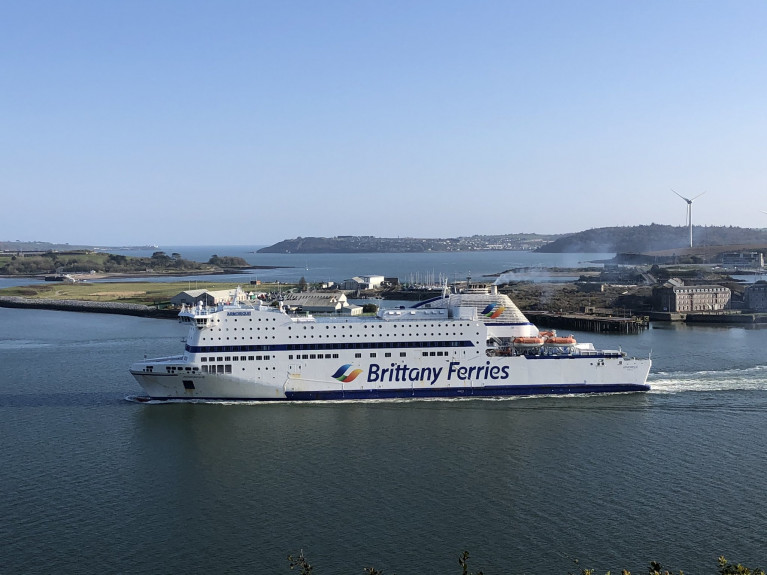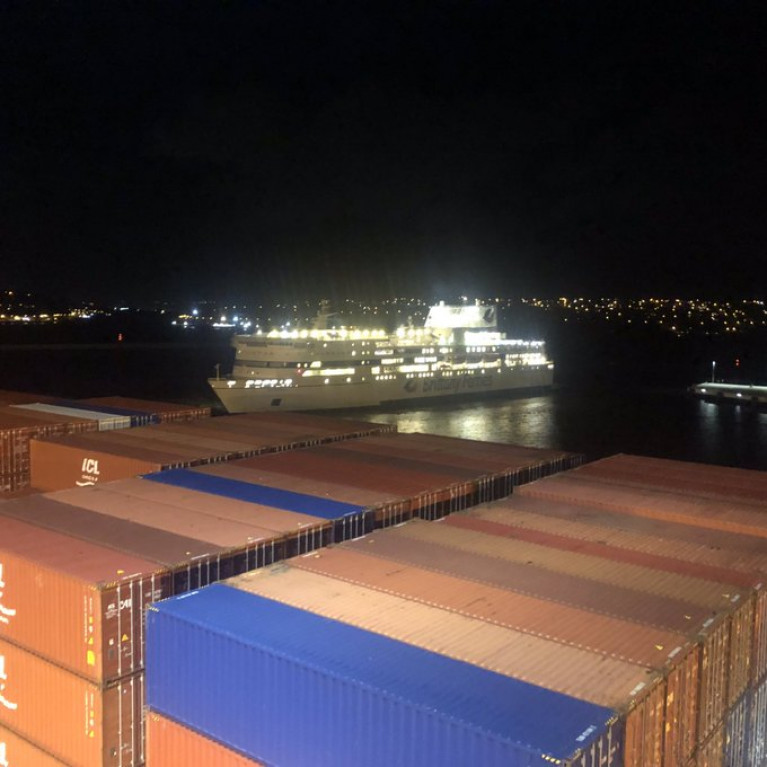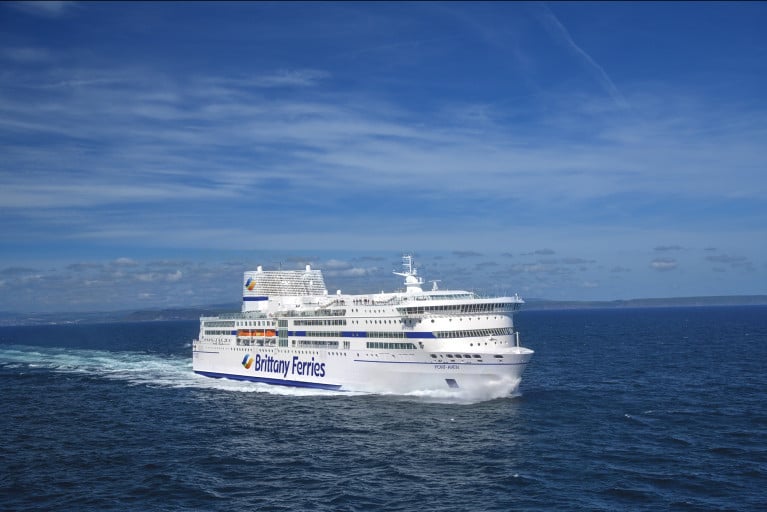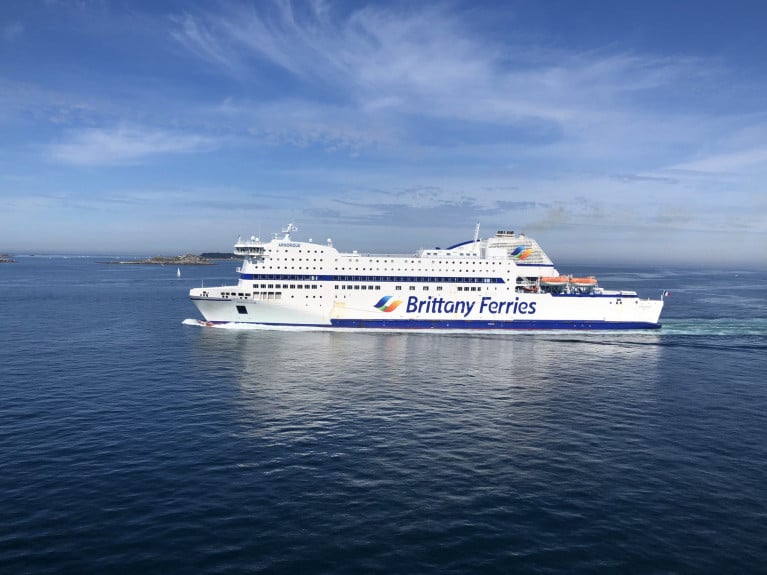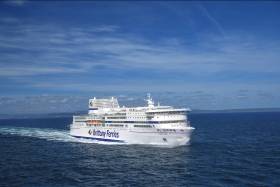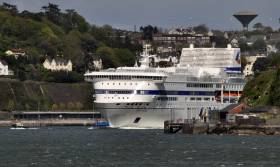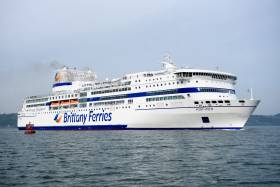Displaying items by tag: CorkRoscoff
Brittany Ferries Flagship ‘Pont-Aven’ On Its 20th Year Returns to Service the Cork-Roscoff Route
Pont-Aven Brittany Ferries impressive flagship at the weekend resumed its first Roscoff-Cork round-trip this season, in the 20th anniversary year since its introduction on the Ireland-France route and UK-France/Spain links, writes Jehan Ashmore.
During Pont-Aven’s return leg to France on Friday-Saturday, it was just a day short of its two-decade-old service date of March 24, 2004, which saw the 2,400 passenger, 650 car, and 85 lorry flagship also make its Irish debut the following month on the Ireland-France connection.
The 40,859 gross tonnage flagship with a Breton registry of Morlaix, was built by Meyer Werft, Papenburg, Germany for BAI S.A. (Bretagne-Angleterre-Irlande), trading as Brittany Ferries. Its introduction marked a significant chapter for the company, which has built up its brand and a strong relationship, including culturally with Ireland, for more than 45 years. This began with the Munster-Brittany link launched in 1978.
At the weekend, Pont-Aven’s return crossing from Cork was tracked off Land’s End, Cornwall, England, from where the flagship also made its debut in 2004 in neighbouring Devon on the Plymouth-Roscoff route and the Plymouth-Santander service.
The 10-deck flagship continues to be one of the most luxurious operating to mainland Europe, despite the introduction of Brittany Ferries new chartered tonnage from Stena RoRo’s E-Flexer class. They are spacious, modern, and have more environmental merit, yet they do not compensate for the level of cruise-ferry that Pont-Aven provides.
With a service speed of 23 knots, though capable of 27 knots, Pont-Aven has the capacity to keep to its intensive route network of connecting France-UK-Spain routes and the additional France-Ireland round trips.
Over the winter, a 3m 'duck tail' was added to the stern to improve operational efficiency and environmental benefits, which is expected to achieve a 10% reduction in fuel and save costs. Also on the matter of the environment is when in 2016 was installed 'scrubber’ sulphur emission reduction technology, which is welcomed, though considerably altered the external aesthetics of the original funnel that is shrouded in a cage-like structure, which is somewhat ungainly.
Overall, having said that, Pont-Aven presents a sleek profile to a ship with a pleasant-sounding name, which refers to the small Breton town made synonymous with artists, and this is reflected throughout the flagship’s interior décor - Afloat will have more about such features.
Since 2022, the flagship has been joined by the cruise ferry Armorique, which, coupled with extending the season, offers more sailings and choice to holidaymakers. Also, this season sees a first for Armorique to feature 18 pet-friendly cabins due to surging demand, as until now, dogs have had to remain in cars during the crossing, whereas Pont-Aven already has 28 pet-friendly cabins.
The route complements Brittany’s Rosslare-Cherbourg route and the longer link to Bilbao in northern Spain, for which Afloat consulted the company’s sailing schedules, sees its first ‘outbound’ sailing reinstated tomorrow, 27 March, operated by Santoña.
As for the first ‘inbound’ sailing, this departs Bilbao the following day, 28 March, and is to be served by Galicia. Up until then, the route across the Bay of Biscay was closed to enable port-related infrastructure works, which led to a temporary Ireland-Spain service retaining Rosslare as the Irish port but redirecting the route instead to Santander.
Both of these Ireland-Spain ferries are of the E-Flexer class, in which the company also has Salamanca and two more newbuilds to enter service, though on English Channel routes replacing ageing tonnage.
Midweek Sailings Brittany Ferries Confirms on Cork-Roscoff Route to be Made Permanent
Operator Brittany Ferries confirmed its recently launched midweek (Armorique) ferry on the Cork-Roscoff route will become a permanent feature of the company’s France sailing schedule.
Although this Wednesday sailing connection is part of a new three-year deal signed by the Port of Cork Company and Brittany Ferries, this commercial partnership between both companies has lasted over four decades.
“These investments from the Port of Cork and from Brittany Ferries are symbols of optimism, ambition and celebrate the long-awaited ability for people both in Ireland and France to enjoy renewed freedom after such a challenging two-year period,” said Port of Cork Company chief executive Eoin McGettigan.
The new sailing has the potential to generate €4.3m from a tourism perspective to the local economy, according to Tourism Ireland CEO Niall Gibbons.
More from the Irish Examiner on the Ireland-France route also operated at the weekend by flagship Pont-Aven.
Afloat adds Brittany Ferries also serve to Spain, sailing from Rosslare to Bilbao and Rosslare-Cherbourg in Normandy.
In addition a freight-only service from the Wexford ferryport to Le Havre also in the same French region.
Surge in Brittany Ferries' Bookings on Ireland-France Routes
Brittany Ferries, which operates the Ireland-France route of Cork-Roscoff, has reported a surge in bookings for summer 2022.
Since the onset of the pandemic, as Echo Live reports, the ferry company has navigated what it calls two "disastrous" summer seasons, where they lost €220m in 2020 alone.
However, an increase in reservations for next year has brought renewed optimism.
In a statement released today the company said that by the end of last month, 188,878 passengers had booked trips for July to September 2022 - a 48% increase from the 2020 summer season.
Reservations on routes between Ireland and France are currently up 234% and reservations on the Rosslare and Bilbao, Spain route are up 80%.
“The storm clouds are beginning to lift and I welcome the boost in reservations for next year,” said company CEO Christophe Mathieu.
“We are so grateful to our loyal customers. The support of the French government combined with the loyalty of our Irish and British customers will allow us to continue the beautiful voyage of this company.”
Brittany Ferries Postpone Resuming Passenger Services Out of Cork Harbour
Brittany Ferries has announced that due to the current Covid-19 travel restrictions, its flagship passenger route out of Cork Harbour to Roscoff,France will not now resume at the end of March.
The operator which in 1978 began the route, will be kept under review and it is anticipated that services will recommence in mid-May. 'Freight' only Brexit-Bypass sailings out of both Cork and Rosslare to France will continue as scheduled. In addition Afloat adds, 'freight' routes of Rosslare-Cherbourg and to Bilbao, Spain.
The move follows the continued stringent travel restrictions for passengers with only essential travel. The decision by Brittany Ferries (re-think) also sees the continuing suspension of a number of their other passenger services between the UK, France and Spain.
In the coming days, Brittany Ferries will contact customers who hold bookings on affected sailings, to offer alternative travel or a refund.
“Naturally we very much regret any inconvenience that these changes will cause our customers,” said Christophe Mathieu, Brittany Ferries’ CEO. “We had hoped for a return to service for all our routes in mid-March, but the reality is that most people are simply unable to travel at this time. Booking levels are extremely low and we are relying on loans to carry us through this difficult period. It is therefore simply not viable to run loss-making routes at this time.
“But we continue to monitor the health and travel situation in all our markets – UK, Ireland, France and Spain. As soon as our customers can travel again, we will be there for them. We are also pushing governments to set out a pragmatic, co-ordinated and clear roadmap to safely re-open travel as soon as the health situation permits. We believe that the ramp-up of vaccines means that this re-opening could be considered sooner rather than later.”
Brittany Ferries says it will remain a predominantly freight-only service for now. However, while it thanks all freight customers and drivers for their support during the crisis, only 20 per cent of its annual turnover comes from freight traffic. Around 80 per cent of annual income is generated by holidaymakers.
Brittany Ferries Summer Sailings Operating Plus Second Cork-Roscoff Cruiseferry for Season '2021'
Brittany Ferries flagship began Cork-Roscoff seasonal service earlier this month following lifting of Covid-19 restrictions and notably another cruiseferry is to enter the popular Ireland-France route too but not until 2021, writes Jehan Ashmore
Asides the current routine Saturday afternoon departures from the Port of Cork by flagship cruiseferry Pont-Aven which arrives to the Breton port on the Sunday morning, Afloat has noted on the Brittany Ferries website that there will be the added choice next year to board another cruiseferry. This is to be the Armorique offering a Wednesday afternoon departure from Ireland with an arrival on Thursday morning at the Breton port in north-west France.
The development is apparently only referred once on the website in regards to the new Irish role for Armorique's Wednesday departures see within brackets (new for 2021).
Afloat also consulted the booking section which revealed Armorique's first outward sailing, Cork-Roscoff is scheduled for Wednesday, 24 March followed three days later with Pont-Aven departing on Saturday, 27 March 2021.
Armorique has actually previously called to the Port of Cork last year on foot of standing in for Pont-Aven which had hydraulic and beforehand engine-trouble with repairs both taking place at Damen Shiprepairs, Brest.
The introduction in next year's season of the Armorique will increase overnight ferry departures to twice a week on the Cork-Roscoff route. Luxury facilities of the cruiseferry are available for 1,500 passengers and accommodation comprises of 247 cabins and reserved seat lounges for 336 and space for 470 cars.
Also according to the ferry website, Afloat noted the Pont-Aven's sailing times (from Cork) take 14 hours however with next year's seasonal newcomer Armorique are timetabled for an 18 hour passage. As for sailing duration times (from Roscoff) both cruiseferries sailings are reduced. Two hours for those operated by the Pont-Aven and three hours served by Armorique.
Currently Armorique operates routine daily Roscoff-Plymouth sailings on the English Channel route which saw the custom Finnish (STX Europe) built cruiseferry enter service in 2009. The Armorique takes her name from an area of north west France meaning 'the country that faces the sea' and follows a predessor of the same name that launched the Cork-Roscoff route more than four decades ago in 1978. Pont-Aven also operates in tandem on the France-UK route, which was Brittany Ferries first route when launched in 1973.
This afternoon Pont-Aven is scheduled at 16.00hrs to depart Ringaskiddy Ferry Terminal in lower Cork Harbour on the overnight crossing of the Celtic Sea to Roscoff.
In addition Brittany Ferries which closed the Cork-Santander earlier this year and switched both Irish and Spanish ports to begin a new Rosslare-Bilbao route served by ropax Kerry and on an 'économie' service has resumed for passengers. As the Kerry had operated throughout the height of the Covid-19 restrictions by maintaining the Ireland-Spain link albeit in a freight-only mode.
The French operator had intended to launch a second new route out of Rosslare Europort, however Covid-19 also impacted the new Rosslare-Roscoff route which was due to open in March. This never materilised due to restrictions from governments and by the ferry company itself in the interests of crew.
Rosslare-Roscoff sailings finally launched late last month on 29 June (later than planned due to Covid-19). This route is also branded under the économie banner as the ropax Kerry has no-frills facilities compared to the luxurious Cork-Roscoff serving flagship cruiseferry.
The Ireland-France route along with Rosslare-Cherbourg in neighbouring Normandy was abandoned by Irish Ferries following the debut of W.B. Yeats operating instead out of Dublin Port but still retains the connection to the port located at the tip of the Contentin Peninsula in northern France.
Returning to Brittany Ferries which will continue operating both the seasonal Ireland-France routes until late October, whereas the Rosslare-Bilbao remains a year round service. Noting the Ireland-Spain overnight service subject to the sailing taken can involve up to 2 nights on board.
For Coronavirus updates, travel advice click here with important links.
Ferry Service Cork-Roscoff to Resume this Friday
It has been confirmed by Brittany Ferries that its Cork-Roscoff route will resume service this Friday as expected.
The announcement reports EchoLive.ie comes three weeks after the Pont Aven ferry suffered a hydraulic failure impacting thousands of people expecting to sail between Cork and the French port.
Difficulties in securing parts for repairs to the ship meant the vessel was out of action longer than Brittany Ferries had originally expected.
While Brittany Ferries said it was working with those affected in arranging alternative plans or refunds, some people felt they were left in the dark.
More on the story can be read here.
The operator of the Cork/Roscoff route, Brittany Ferries regrets its flagship cruise-ferry Pont-Aven, which has been out of service undergoing repairs since Friday 17th May, will now not be able to resume sailings until Friday 14th June.
As a consequence the company in a statement has confirmed Pont-Aven's sailings on the company’s Cork/Roscoff route have had to be cancelled this weekend (Friday 31st May and Saturday 1st June) and the following weekend (Friday 7th and Saturday 8th June).
In addition to a number of cancelled sailings (albeit based out of the UK) on the company’s Plymouth/Santander and Plymouth/Roscoff routes.
The company’s technical teams have been working around the clock with the Damen shipyard in Brest to carry out repairs to the ship’s starboard-side steering gear (Afloat adds this follows a separate incident that took place late last month). Despite these efforts it has now become apparent that this work will take longer than initially planned, whilst replacement parts are delivered and installed, and comprehensive checks are carried out.
“On behalf of everyone at Brittany Ferries I would like to apologise profusely for the further delays to the return of our flagship Pont-Aven, and the disruption that this will cause to travel plans. It’s a frustrating situation, but our priority now is to contact all customers who will be affected by this situation and to make sure that we look after them as best as we can.” said Christophe Mathieu CEO Brittany Ferries.
In order to give affected customers the best possible opportunity to arrange alternative sailings, additional sailings will be operated on the Plymouth/Roscoff route, and some Cork/Santander rotations will be diverted to Cork/Roscoff.
Over the coming days the company’s customer relations teams will be contacting all customers with bookings aboard Pont-Aven for travel between now and 14th June. Those who are due to sail soonest will be contacted first. An alternative sailing will be offered where it is available, but if no suitable alternative is available then a full refund will be offered. Due to the exceptional number of phone calls involved, affected customers are kindly requested not to call, but to wait to be contacted by Brittany Ferries.
For further updates they will be posted online (click here) on the operators website.
More Ireland-France Sailings Cancelled As Brittany Flagship Is Off Service for Repairs
Brittany Ferries have been forced yet again to cancel sailings on its Cork-Roscoff route due to operational reasons as flagship Pont-Aven continues to be beset with technical issues, writes Jehan Ashmore.
Currently Pont-Aven remains in dry-dock at Damen Shiprepair, Brest, following an hydraulic problem which took place in mid-May while on a sailing from the UK to France.
The incident led in turn to cancelled sailings on the Ireland-France route where affected passengers to date and next weekend (1 June) have been offered to defer the sailing to a later date (subject to availability) or cancel and receive a full refund.
Brittany Ferries are in the process of assisting customers and await a confirmed date of Pont-Aven's return (see updates) in addition the operator have taken the precaution of blocking any further bookings on cruiseferry between now and 7 June.
Communication of developments will also be made as soon as possible via our sailings update page.
An in-depth investigation has begun by the French operator into the incident.
Commenting about the incident Christophe Mathieu, Brittany Ferries CEO who said “We are all truly sorry for the further problems with our flagship vessel Pont-Aven. Unfortunately she has suffered two technical problems in rapid succession. While the previous engine problem, which reduced the ship’s speed from 24 knots to 20 knots, is entirely unrelated to the current steering gear issue, the consequence of further bad luck is significant inconvenience for our passengers."
The German built Pont-Aven is fitted with two entirely independent Rotary Vane steering gears, each operating one of two rudders. These are self-contained units positioned at her stern directly above the rudders . Hydraulic oil is injected at high pressure into a series of chambers which operate the rotating part of the steering servo-motors. As these chambers fill, the rotor turns, thus moving each rudder in the desired direction.
According to Brittany Ferries, Pont-Aven’s engineers were alerted to low oil pressure in the starboard steering gear. An oil leak was identified which caused the pressure loss and a reduction in steering capacity. Under these circumstances, the decision was immediately taken to take Pont-Aven out of service in Roscoff, for investigation and remedial work to be carried out in Brest.
Unfortunately, following further investigation it was found that damage to the starboard side steering gear was more extensive than originally suspected. This has meant a longer lay-over in Brest than originally planned to source replacement parts and carry out a comprehensive repair.
A repair procedure has been defined with the agreement of Bureau Veritas (certification authority) and the manufacturer. In parallel, a complete check of the port steering gear has been carried out.
Every Little Helps As Brittany Ferries Propel Pont-Aven With Additional Sub-Propellors
#ferries - Brittany Ferries Cork-Roscoff cruise-ferry Pont-Aven began today its first sailing in 2019 on the seasonal route and will save energy and reduce fuel consumption thanks to the installation of two innovative devices on the ship's propellers.
Wärtsilä‘s EnergoProfin system is a small sub-prop, which is attached to the main propeller helmet, helping improve propulsion in water. Two of these devices were installed during the ship’s dry dock in December 2018. As a consequence fuel consumption and emissions have been cut by around 2% on every crossing.
This project is a small – but significant – step and it comes as part of a range of studies initiated through Brittany Ferries’ Research and Development program. But, as Vincent Coquen, Head of R&D, Energy and Environment for the company, explains, it is not just a question of developing practical and technical solutions for today such as the propellers on Pont-Aven.
“Sustainable development means looking to the future and studying innovative projects and technologies that could be used in either the short or longer term,” he said.
For the past two years, Brittany Ferries has partnered with CEA Tech in France. Several projects are underway, including the development of a long-range broadband link that would use land-based transmitters to obviate the use of satellite-at-sea. A second study focuses on hybrid energy solutions for Cap Finistère, Brittany Ferries cruise-ferry that sails from the UK to Spain. The last is exploring the long-term implementation of fuel cells for powering certain of the ship's on-board systems.
Brittany Ferries is also looking at the potential for wind energy. Flettner rotors, traction wings, or modern sails are at different stages of development, but could significantly reduce ship fuel consumption and therefore emissions.
“Of course, we must be cautious, checking the feasibility of integrating these technologies on board our ships, in terms of safety, reliability and profitability,” added Vincent Coquen. “But I am convinced that they will have a significant role in the equation that ship-owners must solve to achieve the zero emissions ship.”
Fresh New Look to Be Rolled Out Across Brittany Ferries Fleet
#ferry - A fresh new look involving a splash of colour across the Brittany Ferries fleet sees a bright new logo in striking shades of blue, orange and green!
The new design, which comes with a more modern, warm and lyrical typeface, will be applied to each ship during refit, and will eventually be emblazoned on the side of every vessel’s hull and funnel.
The logo according to Brittany Ferries is the result of extensive customer research. The design more truly reflects the fullness of the ferry operator's experience: the richness of travel by sea, the warmth of the welcome ashore and on board, and the spirit of discovery for some of Western Europe’s most beautiful holiday destinations.
As well as a ferry operator Brittany Ferries is a holiday company too, with four decades of experience arranging sail-and-stay packages. Today the company offers thousands of hotels and holiday properties in France, Spain, Ireland and the UK making it one of Europe’s leading tour operators. The new logo reflects its destinations, with blue, green and orange shades evoking the seas, landscapes and skies of the holiday regions Brittany Ferries serves
On the Irish services, Afloat adds is the Cork-Roscoff (seasonal) service that ended earlier this month (see Pont-Aven's Route du Rhum story) though the newly launched first ever direct Ireland-Spain route of Cork-Santander continues sailings on a year-round basis.
The new visual identity comes as part of a multi-million euro investment to make Brittany Ferries fit for the future. Three brand new ships are currently under construction and due to join the fleet in 2019 Honfleur, 2021 Galicia and 2022 Salamanca, see story. Afloat adds Honfleur, a LPG powered ferry under construction at the FSG yard in Germany, is to enter English Channel service between Portsmouth-(Oustreham) Caen.
A wide-ranging digital transformation programme is also underway, aimed at enhancing every aspect of the customer experience from researching to booking, checking-in, sailing, holidaying and returning home.
Florence Gourdon, marketing director explains: “This is the right time for an exciting change. We last evolved our logo 15 years ago (see Bretagne, former flagship on Irish route) and so much has changed in that time – for example we now live in a digital world. And while the previous logo fully communicated the reliability and trustworthiness of our ferry service, it didn’t fully embody the emotional side of travelling and holidaying with Brittany Ferries and the discoveries inherent in the fabulous destinations we serve.”
“This new look stands for everything that makes our brand: the quality of our products and services, the passion, pride and professionalism of our teams, and our bright future with brand new ships and rich experiences on the horizon.”
The new design was first glimpsed by eagle-eyed ship spotters at the shipyards where Armorique and Pont-Aven are currently undergoing winter refits.
Afloat adds Pont-Aven is recieving such work as part of routine winter drydocking in Spain at the Astander Yard in Astilleo. The flagship having shifted on 11 November from nearby Santander where the direct continental Cork service as previously mentioned is maintained year round by the chartered-in ropax tonnage, Connemara.
The ships from the fleet will shortly return to service sporting the new look. The new logo will be unveiled further over the coming days. Then, and throughout 2019 it will be rolled out across all Brittany Ferries sites, marketing and operations including everything from signs, brochures, uniforms, to advertising and websites.


























